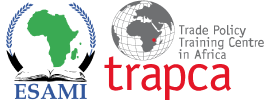Overview
Global trade in food and feed crops has accelerated over the period. Statistics have shown that over the years Agricultural trade increased by a factor of eight. However, at region level, only the Americas (North and Latin America) have a bigger share in exports of agricultural and food products, whereas the other major regions, especially Africa their share of agricultural exports is very small, partly due to failure to comply with standards.
Standards and conformity assessment have crucial underlying goals: not least, ensuring consumer safety and helping protect the environment. At the same time, businesses and governments around the world are concerned that behind-the-border measures such as product standards can have downsides for market access and international trade. Indeed, such measures, together with Sanitary and Phytosanitary Measures (SPS), are often cited as major obstacles to trade, even ahead of tariffs. Consequently, this course provides an in-depth analysis of Multilateral trading system and trade facilitation, trends in agricultural trade and standards, the role of standards and SPS in agricultural and food trade, Standards facilitation at bilateral, regional and multilateral level; establishment of standards for international agricultural trade ; accreditation, public and private standards. The course uses case studies involving African Countries and Regional economic communities from African.
Who is it for?
The course is designed for policymakers, standards officers, technocrats and researchers involved in agricultural trade, and private industry captains involved in agricultural trade.
How participants will benefit.
At the end of the course, participants will be able to:
Fees and other costs
The fee for the programme will be payable in US dollars and will cover tuition, presentation material and other documentation. It also includes lunch and refreshments during each working day. Discounts are available for every 2 or more delegates registered from the same institution.
Course Fee: $1800
Venue: Mombasa, Kenya. However, subject agreement with clients, the course may be offered in any of the following venues: Kampala, Uganda, Mombasa, Kenya; Nairobi Kenya; Livingstone Zambia; Arusha, Tanzania and Dubai.
Dates: 24-28 April 2023
How to apply
Prospective participants should apply by filling the form below.
Inquiries
For any inquiries, kindly write to admissions@trapca.org
